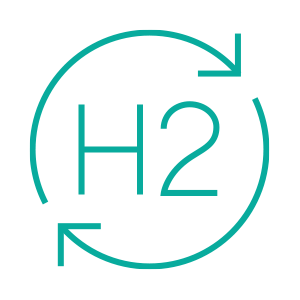
Why hydrogen?
Hyzon builds hydrogen fuel cells that provide zero-emissions power tough enough for the world’s most demanding jobs — including trucking, shipping, stationary power, and more.
Fueled by hydrogen, an energy source as powerful as it is accessible. As lightweight as it is energy dense. And as we transition the world to hydrogen energy ecosystems, it can be as affordable as it is abundant.
-

Hydrogen is found everywhere — in water, natural gas, and even garbage. Produce it with renewable resources, and the resulting hydrogen is clean.
-

The most energy-dense molecule on Earth packs power with less weight, making it the perfect fuel for demanding industries where every pound matters.
-

You can refuel your hydrogen-powered vehicles in the about the same time it takes to refill a diesel tank. Less time refueling means more time at work.
“Hydrogen is turned into fuel and the by-product is water, there’s not a better or cleaner equation than that”
John Edgley - Managing Director ANZ
Key Q&A
-
Instead of focusing on grey, blue, or green hydrogen, Hyzon looks at the total carbon intensity of the production process: how much carbon is produced, avoided, or removed? A lower score means less emissions, while negative scores indicate that carbon was removed from the environment. Hyzon’s strategy focuses on low-to-negative carbon intensity hydrogen.
-
Hyzon is focused on providing affordable, low-to-negative carbon intensity hydrogen. Depending on the location and amount of hydrogen demanded, different types of feedstock might be more cost-effective or cleaner. By co-investing in a variety of production technologies, Hyzon can utilize the feedstock that is available within a fleet’s operating footprint, creating a local circular economy.
-
At the current early state of adoption, initial fleet deployments by customers require 2-5 tons of hydrogen per day (fueling 40-120 heavy duty trucks per day). By developing hubs that are economically viable even at low volume, Hyzon is building a highly utilized infrastructure that can scale up to accommodate new customers.
-
Hyzon’s high-tech fuel cells are the result of being in the business of hydrogen since 2003. Our singular goal is to accelerate the clean energy transition by providing zero-emission vehicles with no compromise on power or range. This low-cost, clean hydrogen infrastructure approach synchronizes supply with demand, putting clean trucks on the road faster.
-
Hyzon has manufacturing facilities in the United States, Europe and Australia.
-
The range on a vehicle is dependent on the duty cycle or use case of the vehicle. Our heavy-duty garbage truck has been designed against the industry benchmark of 200-kilometre range and 1500 bin lifts.
-
Yes. Hyzon-manufactured fuel cells are just as powerful and have the added benefit of zero emissions, energy efficiency, and a smooth, near-silent driving experience. As an example, Hyzon Heavy Rigid Chassis provides 275 kW of power (410kW peak) whilst delivering up to 2,400 Nm of torque.
-
Quick refuelling is one of the key benefits of hydrogen fuel cell vehicles. Our vehicles are typically refuelled in 15-20 minutes up to 350 bar.
-
Yes. In fact, hydrogen is much safer than gasoline. A number of its properties make it safe to handle and use. Primarily, hydrogen is non-toxic, meaning that any leaks or spills will not contaminate the environment.
Moreover, when released, hydrogen disperses extremely quickly, greatly reducing the risk for accidental ignition unlike vapours from gasoline or propane.
H2 is a well-established industrial gas having been used for more than 100 years. Use is regulated supporting state of the art technologies for production, storage, and distribution.
TPRD (Temperature pressure relieve device): this quick release system operates in extreme conditions by venting the H2 contained in the HSS in high temperature and potential high-pressure scenarios. The quick release mitigates high risk hazard area consequences.
-
Fuel cell vehicles use hydrogen to power an electric drivetrain (Electric motor and all accessories. Unlike conventional vehicles that run on gasoline or diesel, fuel cell vehicles combine hydrogen and oxygen within a fuel cell to produce electricity, which is directed into the electric motor and/or the battery, as needed. Fuel cell vehicles have a long range, are easy to refuel, are practically silent, and only emit water vapor.
-
Only positive. Hydrogen-powered vehicles emit nothing but water vapor. Therefore, Hyzon’s vehicles significantly cut greenhouse gas emissions from the transport sector, particularly in the harder-to[1]decarbonize heavy vehicle segments.
-
At the current early state of adoption, initial fleet deployments by customers require 2-5 tons of hydrogen per day (fueling 40-120 heavy duty trucks per day). By developing hubs that are economically viable—even at low volume—Hyzon is building a highly efficient infrastructure that can scale up to accommodate new customers.

